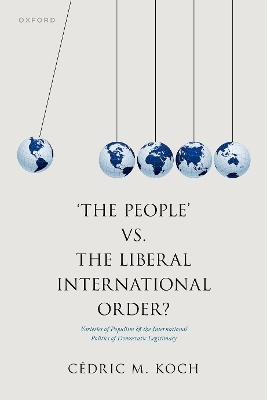
'The People' vs. the Liberal International Order?
Oxford University Press (Verlag)
978-0-19-890102-0 (ISBN)
Why, since the 1980s, did populists rise across liberal democracies? And, given that they challenge democracies and the liberal international order (LIO) in radical but diverse ways, which variety of populism gains under which conditions? Rather than emphasising populists as a cause of the crises of liberal order, 'The People' vs. the Liberal International Order? argues that the historical empowerment of liberal international institutions itself gradually undermined democratic legitimacy perceptions among citizens and thereby boosted varieties of populism.
Moving beyond theoretical accounts and bridging comparative politics and international relations, Koch presents comparative evidence from survey data, party manifestos, societal data, and international institutional power across 37 democracies between 1980 and 2019 and uses both statistical analyses and a comparative case study of eight states in the EU to support his claims.
Accounting for existing economic, cultural, domestic political, and supply-side explanations, the author shows that normative evaluations relating to international institutions have contributed to gains for populist challengers across the spectrum in recent decades. Yet, the forces which push voters to populists and party competition itself together structurally benefit the populist radical right compared to populism's more inclusionary version on the radical left. Populism by itself, he argues, therefore seems unable to form a cosmopolitan democratic corrective in the new international politics of democratic legitimacy where alternative institutional trajectories now compete for citizen acceptance. Koch argues that for democrats and internationalists to still contain populist forces, rather than merely defending the LIO against 'barbarians at the gate', more self-critical reform enabling policy change and democratisation of liberal international institutions is needed to address the part of their success rooted in the democratic deficiencies of a globalised world.
Dr. Cédric Koch is currently a policy advisor for European and international economic policy at the Friedrich-Ebert-Foundation. Previously, he was a doctoral and post-doctoral researcher at the Berlin Social Science Center (WZB)'s Global Governance Research Unit and the Free University of Berlin, including a research stay at the Universidad Diego Portales in Santiago de Chile. He obtained a Master's Degree in International Relations from the Free University of Berlin, Humboldt University, and Potsdam University, as well as a Bachelor's Degree in Liberal Arts and Sciences from University College Maastricht.
Acknowledgements
1: Introduction: The Rise of Populism and the Crises of Liberal Order
2: Creating its own Enemies? Why the Rise of the LIO strengthened which Varieties of Populism
3: Research Design: Studying Varieties of Populism in the LIO
4: The LIO vs. 'The People'? Populist Support and the International Politics of Democratic Legitimacy
5: In the Name of Which 'People'? Varieties of Populism and the International Politics of Democratic Legitimacy
6: 'The People' vs. The LIO? How Varieties of Populism Challenge Liberal and Democratic (Internationalist) Principles in the LIO
7: Conclusion: Varieties of Populism and the Future of Liberal International Order
References
Appendices
| Erscheinungsdatum | 12.11.2024 |
|---|---|
| Verlagsort | Oxford |
| Sprache | englisch |
| Maße | 162 x 240 mm |
| Gewicht | 1068 g |
| Themenwelt | Sozialwissenschaften ► Politik / Verwaltung ► Europäische / Internationale Politik |
| Sozialwissenschaften ► Politik / Verwaltung ► Politische Theorie | |
| Sozialwissenschaften ► Politik / Verwaltung ► Vergleichende Politikwissenschaften | |
| ISBN-10 | 0-19-890102-X / 019890102X |
| ISBN-13 | 978-0-19-890102-0 / 9780198901020 |
| Zustand | Neuware |
| Haben Sie eine Frage zum Produkt? |
aus dem Bereich


